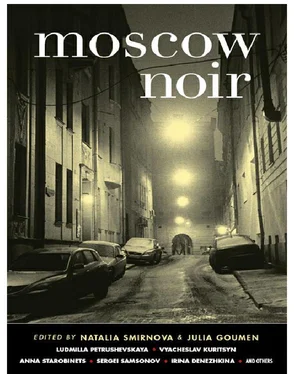A not uncommon compensatory trick.
Actually, all lives are equally real or unreal. The quality of everyday private and public loathsomeness in one of them affords no metaphysical bonuses to others.
It’s just that for some people, everything in life works out. For others, it doesn’t. And you can’t draw any moral lesson from it. Other than: Grief to the vanquished .
I looked at my watch again and frowned. I couldn’t do anything about my habit of turning up early for every appointment, whether important or completely inconsequential; even appointments with people who never show up on time anywhere in their lives.
And really, what’s the hurry?
“But you can always try—”
“Look, Felix, Yanka was a very gregarious young woman. She could have met up with anyone… Plus, it’s been over a year already.”
“Maybe you’ll think of someone else.”
“Oh, I don’t know… Well, there was Pasha from Moscow—she met him shortly before that, I think…”
“Who’s this Pasha guy?”
“Uh, what’s his name—Korenev or something. Just an acquaintance. A long time ago, maybe five years ago, he went to Petersburg, and then, I guess, Yanka saw him in Moscow.”
“So he went back to Petersburg?”
“Looks like it.”
“What did Yanka say about meeting him?”
“Oh god, I don’t remember…”
“Do you have any idea where he lives? A phone number?”
I walked around the square, stomped around on one spot, and sat on the damp stone. I started to smoke, paying close attention to my movements. I remember very clearly how one time, when she was watching me smoke, Tatiana mentioned that I had the gestures of an ex-convict. She didn’t know anything at that time, though. She didn’t know anything yet.
Feeling a moist caress on my face, I raised my head, but it was just the spray from the fountain.
Tin cans rolled around under my feet; empty beer bottles stuck up everywhere.
Suddenly, a dozen or so guys in orange pants sprang up out of nowhere and fell upon them. They quickly tossed the clanking bottles and cans into black plastic bags and hurled them into the maw of a toy tractor.
The struggle for cleanliness continued, apparently in an effort to live up to the name of the place—Europe Square.
Gleb, I remembered, was moved to laughter at the inscription on a plaque by the fountain: As a sign of the strengthening friendship and unity of the countries of Europe, the administration of Moscow endeavored on such-and-such a date to create the ensemble of Europe Square.
There was not much to be said about the friendship between the countries of Europe and Moscow—but most touching of all was the clear sense of identification of the bald mayor of Moscow and Co. with the European Union (immortalizing this was just as logical in Phnom Penh as it was in Moscow, in Gleb’s opinion). We discussed the sacred conviction of our fellow citizens that they live in a brilliant European capital—as evidence for which they usually cite the number of high-end boutiques. Gleb, a dyed-in-the-wool “westernizer,” said that the sincere incomprehension of the difference is the clearest evidence of the difference itself.
Having traveled from one end of the continent to the other and lived in London, with a multientry Shengen visa, Gleb considered himself to be in a position to judge and compare. As an indigenous Moscow resident, he just didn’t like it enough; and he categorically refused to recognize it as a part of Europe. His basic argument was the flagrant disproportion of the size of Moscow to the human being, a point that was difficult to counter.
It was rare that anyone wanted to argue with him. I have hardly ever met a person with such sound and penetrating points of view. Also, his talent for expressing them with charm and panache, both verbally and in writing, made Gleb the soul of any gathering, and the star of liberal journalism.
Liberal , in his case, didn’t refer to a position regarding civil society, but was a synonym for measured restraint. As a matter of fact, for Gleb, this restraint stood surrogate for political views to a certain degree—he wrote equally well, and with equal conviction, in both servile and seditious (and, naturally, glossy) publications. The logic of his ideas was so unassailable that even in the preelection hysteria, the most patriotic bosses didn’t find fault with the author on the subject of his loyalty. Indeed, Gleb possessed the talent (without a tinge of sycophantism) of making every boss like him. I still remember back in school, where he and I became friends, how I looked on in amusement as the slightly wilted schoolmarms of a certain age fell involuntarily in love with the straight-A student.
Gleb began publishing at the age of fourteen; at fifteen he had already made it into print in the prestigious union-wide Soviet journals. At twenty he became the head of a weekly magazine, where I too—after trying to make a living as a homegrown punk rocker and from various meager supplemental earnings—got my first steady and meaningful employment (though I was never officially on the payroll).
Many people back then (and not just friends) said that I was a fine writer. In addition to everything else, I worked a lot, carried out all the assignments from the higher-ups, and got everything in on time. Nevertheless, both my articles and myself (no matter the subject, genre, or depth of pathos) were greeted (and published—if they agreed to publish them) by all managers with some vague initial skepticism, as though they were suppressing (and, later, no longer trying to suppress) the instinct to shrug their shoulders. When I asked point blank one day why they hadn’t printed any of my reviews for more than a week, and some fat-assed jerk of a deputy editor muttered in slight exasperation, “You always pan everything, but, you know, people watch those movies and read those books; you just turn up your nose at them!”—I finally decided that it was time to call it quits.
And I did. For two years. Though I firmly believe this had nothing to do with journalism itself.
Of course, in a frenzy of self-searching, I acknowledged (according to an elementary logic) my own mediocrity. But to be honest, I never believed it. And I don’t think it was only due to self-love. I knew I was good at what I did. The fact that no one needed it was another matter altogether. It was precisely my product that they had no need for. Someone else’s—Gleb’s, for instance—of the same subject and quality would be snatched up immediately.
I never understood why. I ultimately came to the conclusion that there was no reason. There are no rules, and no laws. It’s just that some people make it in their jobs, while others don’t. And this work has no objective value. More than that— nothing has objective value.
He should’ve been here already, I thought, looking around and trying to match a person with the voice from the phone yesterday—but none of the men there were paying any attention to me, and one of the two girls sitting right across from me frowned slightly and looked away.
“Dmitry?”
“Felix?”
“Yeah, Dmitry, hi. I called you earlier and you told me you saw Pasha last week.”
“Right.”
“Well, I came down from Petersburg just to meet him and I can’t find him. People say he just dropped out of sight; no one seems to know where he is.”
“Uh-huh, that’s what I heard too; that he, like, disappeared, about a year or so ago. So I called around without much hope of finding him; but what do you know, I got through right away. He’s in Moscow. We got together at that… what’s it called, by Kiev station? You know, Europe Square. We used to hang out there a lot. We used to cross the river and drink beer on that slope, on the grass, with the view…”
Читать дальше












